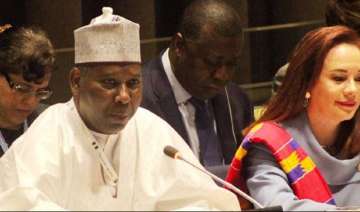General Assembly President Tijani Muhammad-Bande has said that he would use every tool that is available to narrow the gaps in the negotiations for Security Council reform to speed up the decades-long process.
Asked at his news conference on Tuesday about the failure of the reform process to make headway, he said: "Yes, it is very slow but our commitment is to see that we use whatever tools are available through the IGN (intergovernmental negotiations for reform) to narrow the gap so we come to a point where we can say there is light at the end of the long tunnel that there will be fair, and effective reform of the Council and that is where we are at."
He blamed the slowness of the reform negotiations on the inability to reach a consensus.
He said, "The process has not been fast because we want to make sure there have been consensus. That consensus has not been forthcoming."
He listed three areas of differences. "There are major gaps in understanding what the correct number should be in terms of total number of members of the Council to make it effective (and) still representative. And the debate concerning what to do with veto, should it continue and if it continues in what form," he said.
"The question of what other regions should have more representation is also part of it," he added.
He said that the Council reform is an issue for all countries, not just Africa, because of the principle of democratisation.
He said, "Africa has been completely left out from membership in the permanent category."
The IGN process was rolled over the current session of the General Assembly as it has been done every year since it was started.
"We take over from (there) and see how far we can push and we are committed to doing this," he added. He said that the Council reform could be a starting point for considering broader reforms.
While the entire UN Charter may require review, a start has been made by taking a "more prudent approach" to tackle Council reform for which the "parameters have been set in terms of the elements for that reform," he said.
"You can see even this more limited review has taken this long," he said.
He said that when the council reform is successfully concluded, Charter review can be considered, he added.
As a background, the main barrier to effective negotiations has been the opposition from mainly a 13-member group of countries known as known as Uniting for Consensus to adopting a negotiating text that lays out the agenda for discussions.
The members of the group, led by Italy and includes Pakistan, each oppose particular countries getting permanent membership in a reformed Council.
India has a stake in the negotiations as it wants a permanent seat on the reformed Council. It has the backing of the United States, France, Britain and Russia in varying degrees.
The basic architecture of the Security Council was laid out in 1945 based on post-war geopolitics where the five countries that became permanent members were the victors and colonialism was still rampant.
There was no representation for Africa or Latin America in the permanent membership.
A modest reform took pace in 1965, increasing the non-permanent membership from six to ten.
The last big push came in 2005 when world leaders at a summit here agreed unanimously to reform the Council, but it has made no progress.
Also Read: Those who thrive on conflict never venture into ray of peace; India gives befitting reply to Pakistan at UNGA
Also Read: Congress stands by government's reply to Pakistan PM's speech at UNGA
Latest World News
